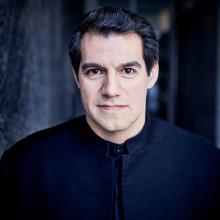The Master of Music degree in Conducting (Band, Choral, or Orchestral) offers rigorous training focused on artistic integrity and leadership at a high level. The program is grounded upon a three-pronged approach: prepare the mind, train the body, and cultivate the soul. Through a thorough study of scores, the development of expressive and clear conducting techniques, and a servant-minded connection to the music and musicians, students are trained to communicate intentional musical ideas while leading and inspiring an ensemble to achieve high levels of artistry.
Regardless of the area of focus (Band, Choral, or Orchestral), graduate conducting students will study under the collaborative guidance of the entire graduate conducting faculty, thus making the MM in conducting at Baylor a unique and comprehensive program.
MM in Conducting Application Details
For undergraduates
We currently offer a Certificate in Orchestral Conducting.
Band Conducting
Band conducting studies are led by Eric Wilson.
Choral Conducting
Baylor's choral conducting studies are led by Kristina MacMullen.
Podium Experience and Recitals
Students in the MM Conducting program (choral emphasis) will gain experiences that both broaden and deepen their musical perspectives and skill set. Graduate conductors are integrated into the regular rehearsal patterns of the Baylor A Cappella Choir, Chamber Singers and/or Bella Voce, where they will learn how to sharpen their rehearsal and gestural skills at the highest level.
Additionally, graduate choral conductors will have valuable opportunities to further their rehearsal and gestural skill as they learn about cultivating choral communities with both vocational and avocational singers having the opportunity to learn from all Baylor choral conducting faculty. These experiences with choirs populated by both majors and non-major singers, such as Bella Voce, Concert Choir, Men’s Chorus and Women’s Chorus, broaden the graduate conductor’s perspectives on community building, rehearsal pedagogy, and repertoire selection as well as gesture.
At the end of their study, graduate choral conductors will have the opportunity to prepare a culminating recital project with A Cappella Choir, Chamber Singers or Bella Voce.
Orchestral Conducting
Baylor’s orchestral conducting studies, led by Miguel Harth-Bedoya, aims to educate solid and inspiring conductors and music leaders, that will be at the service of music, musicians, orchestras, and organizations and communities that love music.
Baylor offers undergraduate and graduate studies in orchestral conducting.
The orchestral conducting program at Baylor is substantial and thorough in studies and performance, and it is structured as a studio of 4 to 6 students, total. The repertoire covered includes orchestral works from all periods including concertos, symphonic-choral works, and operas. In partnership with the Dallas Symphony Orchestra, Fort Worth Symphony Orchestra, and Waco Symphony Orchestra, conducting students can attend their rehearsals.
The Master of Music in orchestral conducting focuses on the study of orchestral, symphonic-choral, and operatic repertoire and its application from the podium. The required conducting portion of the curriculum includes the advanced classes in choral, wind band and orchestra conducting taught by the major ensemble conductors in those areas, a course in Symphonic Literature, studio sessions and a final Practicum with at least 30 minutes of public performance with an orchestral ensemble and a written document on an agreed upon subject that reflects the work (including research and score preparation) done for the Practicum.
Anyone entering the master’s degree in orchestral conducting should have great musical talent which should come across the podium and a solid foundation in musical knowledge (including all clefs, transpositions, score terminology in multiple languages, form analysis), aural skills (including the ability to write down dictations in multiple voices, sight singing, solfege), keyboard skills (including figured bass, play Bach chorales in four clefs, open score reduction), and score analysis appropriate for the study and interpretation of orchestral works.
Prospective applicants for graduate studies are asked to submit a video demonstrating their musicianship performing on an instrument or voice and conducting footage of themselves rehearsing and performing (camera from the orchestra’s perspective). From that initial screening, following an online interview, finalists are invited to campus to take an assessment exam, to interview with the conducting faculty, and to audition with the Baylor Symphony Orchestra and other ensembles as needed.
MM in Conducting Application Details
For more information, including the Certificate in Orchestral Conducting and other undergraduate studies in orchestral conducting, please email Miguel Harth-Bedoya, Mary Franks Thompson Chair for Director of Orchestral Studies, and Music Director, Baylor Symphony Orchestra, at miguel_harth-bedoya@baylor.edu.


